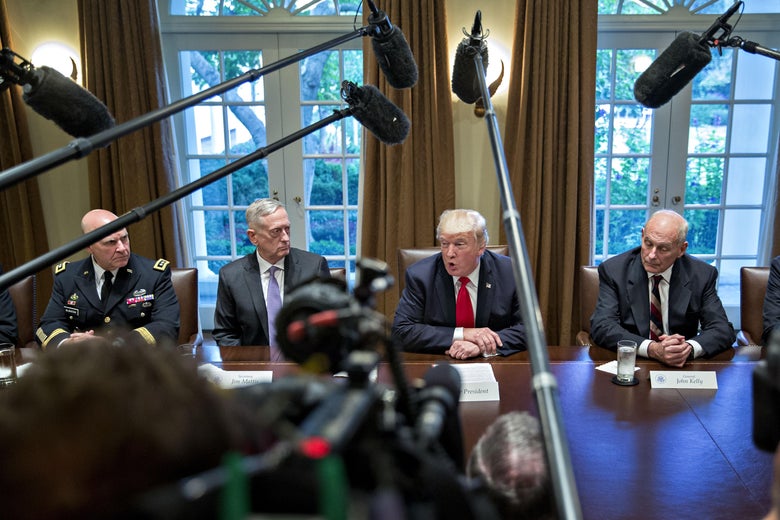
President Trump’s decision to announce Thursday that he would recognize Jerusalem as Israel’s capital reportedly divided his advisers, with Secretary of State Rex Tillerson and Secretary of Defense James Mattis opposed to the move and Vice President Mike Pence, chief of staff John Kelly, and Ambassador to the United Nations Nikki Haley arguing for it. Donor Sheldon Adelson was also a key voice urging Trump to make this call, according to the Washington Post.
That Trump would disregard Tillerson’s advice is hardly surprising at this point, but the fact that Mattis couldn’t sway his boss is a little more concerning. Bloomberg reports that Mattis was worried “about a potential backlash and resulting security threats.” Asked by reporters to describe his position earlier this week, he said only, “I made my recommendation, and I’ll just leave it at that.”
Over the past year, there’s been a comforting idea held by those of us who are concerned about a leader this erratic: that the “grown-ups in the room”—who in this case are mostly military men like Mattis, Kelly, and national security adviser H.R. McMaster—could rein in his worst impulses. A surprising upside to Trump relegating national security decisions to the generals is that these generals tend to have fairly conventional views.
There’s been some evidence that this works. Mattis has talked the president down from his campaign pledge to bring back torture, McMaster has purged the National Security Council of Steve Bannon’s ideological influence, and Kelly has kept John Bolton and his bad Iran ideas away from the president’s ears. The result is a foreign policy that’s been less of a break from convention than we might have expected at the outset.
But the Jerusalem decision suggests there are limits to how much the grown-ups can accomplish when Trump’s ego and political priorities get involved. The Post quotes one Trump confidant saying, “The decision wasn’t driven by the peace process … The decision was driven by his campaign promise.” He also reportedly told attorney Alan Dershowitz, “I’m going to do it. Every other president has promised, and all of them didn’t keep their promises.” Pence “told Trump that his base would love the decision, something the president liked to hear.” These factors were evidently enough to outweigh warnings that recognizing Jerusalem would cripple efforts to negotiate an Israeli-Palestinian peace deal—a goal he has expressed interest in—and could put American lives at risk.
All of this made me imagine a scenario: North Korea test-fires an intercontinental ballistic missile thousands of miles into the Pacific in its most brazen display yet. The White House considers responding with military force. Mattis and Tillerson (if he’s still on the job) warn against military action, arguing that there’s no way to secure North Korea’s nuclear sites without a ground invasion and that North Korea could retaliate against U.S. military targets in South Korea and Japan. The governments of those two countries as well as his good friend Xi Jinping of China would also beg Trump not to attack, knowing that a war on the Korean peninsula could cost thousands or even millions of lives, even if North Korea is unable to use its nuclear weapons. Above all, the voices of caution would say, Trump must not strike first with nuclear weapons, ending more than 70 years in which the countries possessing the world’s most powerful weapons have refrained from using them.
Then he would consider some other factors: one, that polls show a majority of Americans support using military force against North Korea if diplomatic efforts fail and would probably support nuclear first use as well. Two, that Bill Clinton, George W. Bush, and Barack Obama all failed to prevent North Korea from developing nuclear weapons. And three, that he’s been vowing since before he became president to stop North Korea’s tests and repeatedly threatened to use military force if the provocations continue. Failing to do so after all the tough talk is starting to make him look weak.
How confident are we that the grown-ups will be able to talk him down?
One more thing
You depend on Slate for sharp, distinctive coverage of the latest developments in politics and culture. Now we need to ask for your support.
Our work is more urgent than ever and is reaching more readers—but online advertising revenues don’t fully cover our costs, and we don’t have print subscribers to help keep us afloat. So we need your help. If you think Slate’s work matters, become a Slate Plus member. You’ll get exclusive members-only content and a suite of great benefits—and you’ll help secure Slate’s future.
Join Slate Plus